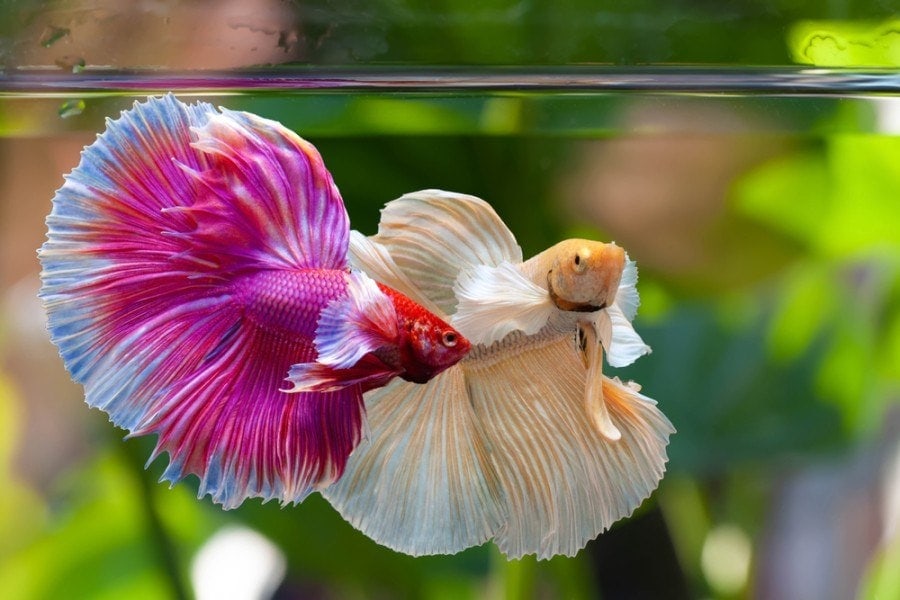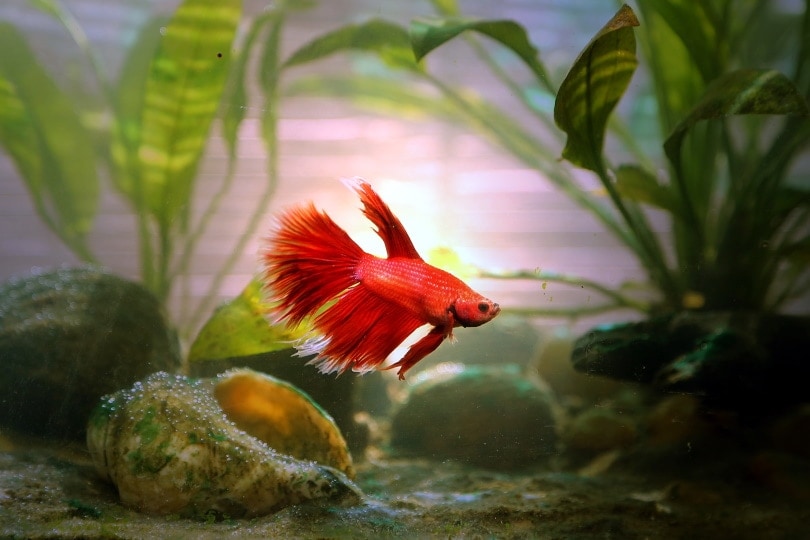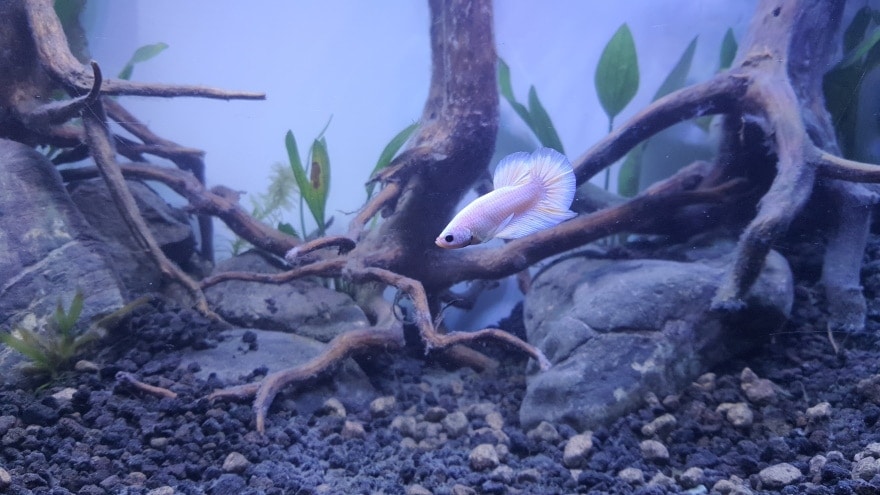Why Is My Betta Fish Not Moving? 5 Vet-Approved Reasons

Updated on
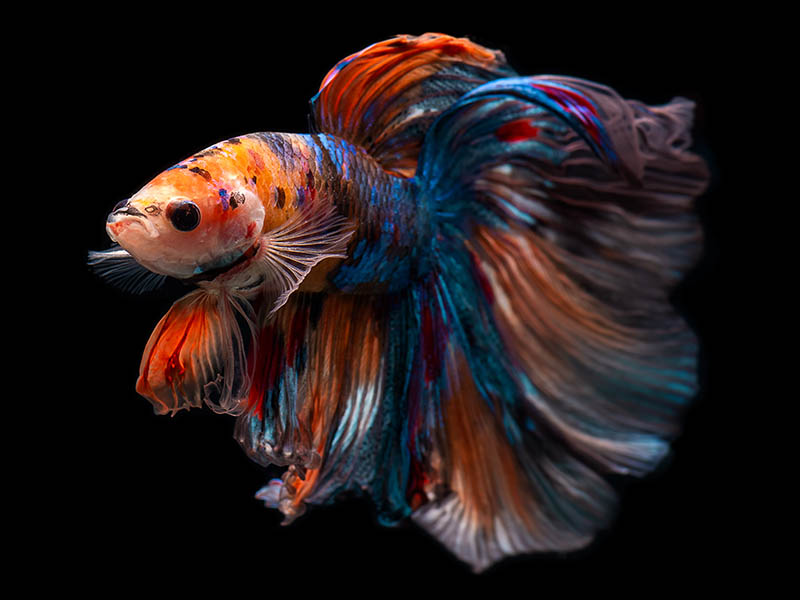
Betta fish are very lively with big personalities and even bigger colors. Has your Betta fish been very inactive, lethargic, and does not eat much?
Well, do not automatically jump to conclusions, because there is more than one reason as to why your Betta might not be moving much or moving at all. Yes, there are the obvious things, but there are also some causes that might not be quite as bad as you think.
So why is my Betta fish not moving? Well, the short answer is there could be many reasons, from resting to improper feeding. Keep reading as we explain further.
The 5 Reasons Why Your Betta Fish Not Moving
There are a few different reasons why your Betta fish is inactive, lethargic, or does not appear to move.
Yes, some of these are very bad and might spell the end for your Betta, but there are some not-so-serious causes as well, although even these need to be looked after ASAP if you want your Betta to continue living a happy and healthy life.
1. Sleeping or Resting
Just like humans, Betta fish need to rest. Yes, all things need to sleep at one point or another. This is how bodies regenerate energy and it is how normal bodily functions keep going. Betta fish need to sleep. Most Betta fish like to sleep in a quiet spot with minimal currents and disturbances. The natural preference of Bettas is to sleep near the water surface, on a leaf or similar perch.
If your Betta fish is not moving much, it could just be asleep. It is best to not disturb your Betta if you think they are asleep and the tank is in a dark room. A sudden flick of the tank, water swirl, or turning the light can sometimes shock fish into death. Bettas should ideally be housed in a 14:10 light:darkness schedule, that is, 14 hours of light followed by 10 hours of darkness. It’s best if the first and last hours of the lighted hours are less intense than the others (to simulate sunrise and sunset).
Now, if your Betta fish is sleeping a whole lot, or appears to be sleeping a whole lot, it could be due to another reason. It could be due to improper feeding, illness, or improper tank conditions. It could also be due to the fact that your Betta is getting old and is slowing down due to their advanced age.
Just like with humans, old Betta fish will be more lethargic and inactive than young ones.
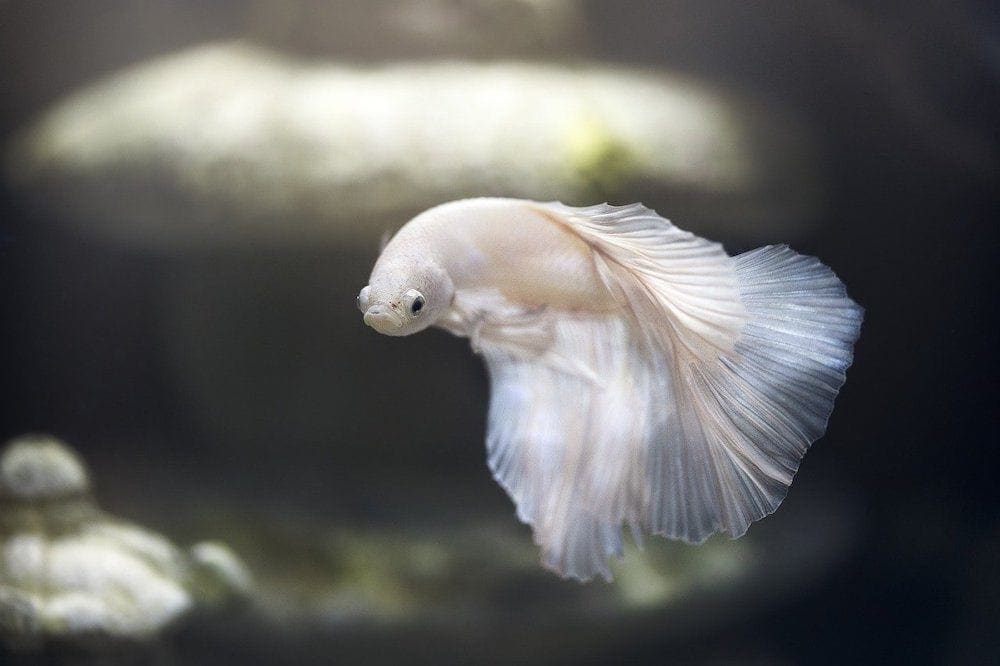
2. Poor Water Quality – Temperature & Other Parameters
One big reason why your Betta fish might be very lethargic and not moving around is because of water conditions that are less than ideal. The most important thing to keep in mind here is the temperature of the water. Betta fish should be in water that is ideally around 82.4 °F (28 °C). Now, if the water is too warm, your fish probably will not be lethargic, but the same is not the case if the water is too cold.
When Bettas are placed in water that is too cold for them, they tend to become lethargic (because, like all fish, they are cold-blooded). Their metabolism slows down and they are also more susceptible to certain diseases or ailments.
So, if your Betta is not moving, check the water temperature and check your heater to see that all is in order. It is best to place their aquarium in a room that’s slightly lower than their required temperature and use the water heater to warm up the water to the appropriate amount.
Bettas may also display varying degrees of stress when the other parameters in their aquarium aren’t correct. Some of these signs may include lethargy, however, lethargy may sometimes only set in once the parameters have been left unchecked for far too long. Ammonia and nitrite levels should always be checked to ensure that they are at 0 ppm. Tap water that isn’t dechlorinated may cause chlorine burns on your fish, which may also lead to a lethargic fish.
- Related Read: How To Check Water Quality In Fish Tank
3. The Betta Has Passed Away
This is obviously the worst-case scenario. Betta fish have an average lifespan of 3 to 5 years, with 4 years being the median. Yes, Betta fish can and do die, just like us and all other creatures out there.
It is unfortunate, but to say the obvious, with all life there is death. You can always check to see if the Betta is dead by flicking the glass, swirling the water around, and looking closely to see if the Betta’s gills are moving or not.
If your fish is over 3, chances are that it is the end if you see absolutely no signs of life, but there are ways to resuscitate fish, though, with advanced age, chances of any resuscitation efforts working are slim to none.
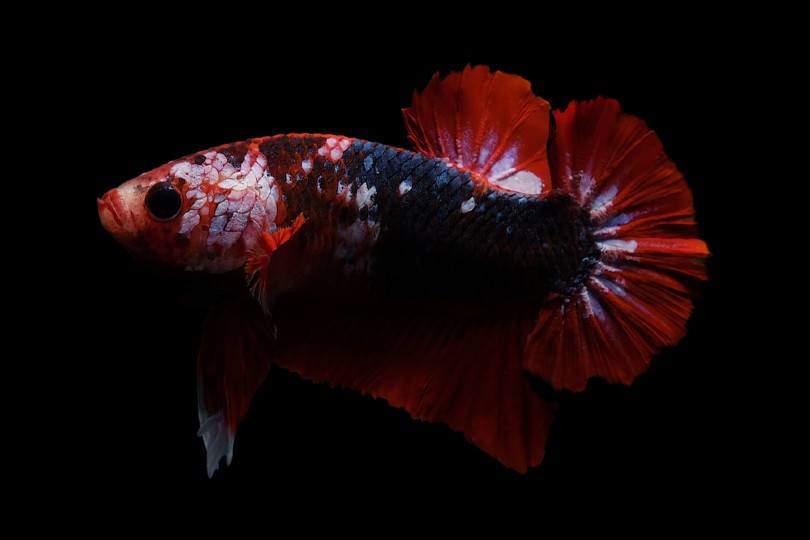
4. Swim Bladder Problems, Constipation, & Other Illnesses
Betta fish tend to suffer from swim bladder problems on occasion. The swim bladder is a pocket that fills up with gas, or empties, depending on what the Betta fish is doing. It is a buoyancy tool that helps them float or sink, and it helps with direction too.
If you notice that your Betta fish is still alive, but not moving, and probably tilted to one side, it probably has a swim bladder issue. Swim bladder issues with Betta fish are most often caused by overfeeding and constipation.
If this is the case, your Betta fish will probably have a swollen or larger-than-normal abdomen. To solve this issue, try to not feed the fish for 3 days, then give them a shelled pea or two, as this should help clear out the blockage. Live Daphnia are an alternative to help with mild constipation episodes.
There are other diseases or conditions that might cause your Betta to stop moving much. These include things like Ich, velvet, tumors or other growths, some fungal infections, parasitic infections, or worms. Each disease is accompanied by other signs as well, though lethargy is considered a common sign seen with many illnesses.
5. Improper Feeding & Food
Constipation aside, if you are not feeding your Betta fish the right foods, it could also be causing them to become slow and lethargic. Betta fish need a whole lot of protein in their diets.
While most tropical fish are omnivores, Bettas do best on a diet that’s suited for a carnivore. This usually involves a high-quality slow-sinking pellet that should ideally be pre-soaked before feeding your Betta. Their diet should also be supplemented with foods such as brine shrimp or tubifex worms. Their minimum protein intake requirement is around 34%, however, they shouldn’t be offered food with a protein rating higher than 43% (unless they are being conditioned for spawning), as this is somewhat inefficient for their optimal growth.

Conclusion
The unfortunate reality is of course that Betta fish do eventually die. However, if your Betta is lethargic, not moving, or not eating, the causes are varied. It could be due to feeding, water conditions, or illness.
In many cases, there are easy solutions to the problems you and your Betta are faced with. Whatever the cause, do not give up right away because there is always a chance of reviving your Betta and getting them back to full health.
You Might Also Be Interested In:
- Why Do Betta Fish Jump Out of Their Tanks?
- 4 Best Betta Fish Tank Heaters for 1, 5 & 10+ Gallon Tanks
Featured Image Credit: NPDstock, Shutterstock


